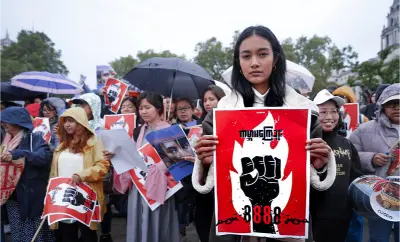Rebels in Myanmar have taken control of some border outposts with India after forcing junta soldiers to flee. The Chin National Front, an ethnic armed group in Myanmar, has announced its intention to strengthen its hold along the India-Myanmar border. This declaration follows their recent seizure of two military camps near India’s Mizoram state border. The conflict has now expanded to both Myanmar’s Rakhine and Chin states, marked by a significant offensive that began in late October. This development is perceived as one of the most substantial challenges to Myanmar’s military government since its ascent to power in 2021.
At least 29 more Myanmar soldiers entered India on Thursday fleeing an attack by insurgents on their military base close to the Indian border, an Indian police official said, as rebels step up their assaults against the ruling junta .
Earlier in the week, 43 Myanmar soldiers entered India’s Mizoram state after their military bases were overrun by the rebels. Nearly 40 were sent back by Indian authorities through a different border crossing point a few hundred kms east.
The conflict in Myanmar is a multifaceted and deeply entrenched issue, with its origins tracing back to the country’s colonial history and ethnic diversity. After gaining independence from British rule in 1948, Myanmar experienced prolonged military rule following a 1962 coup, leading to severe human rights violations and ongoing conflicts with ethnic armed groups representing minorities such as the Karen, Kachin, and Shan, all fighting for autonomy. Among these, the Rohingya crisis stands out for its severity; the Muslim minority group has faced extreme discrimination and violence, culminating in a 2017 military crackdown that led to allegations of ethnic cleansing and a massive refugee crisis.
The country’s transition towards democracy began in 2011 with political reforms, and the 2015 election of the civilian government of Aung San Suu Kyi’s National League for Democracy was a significant milestone. However, this progress was abruptly halted by a military coup on February 1, 2021, led by Min Aung Hlaing, under claims of election fraud. This coup spurred widespread protests and international condemnation, plunging Myanmar into a state of heightened ethnic conflict, civil disobedience, economic turmoil, and a humanitarian crisis.
The international community, including the United Nations, has largely condemned the military’s actions, especially the coup and the treatment of the Rohingya. Yet, global response efforts are complicated by the geopolitical interests of influential countries like China and Russia. Today, Myanmar remains a focal point of concern for regional stability and international human rights, its future mired in uncertainty amid these complex, intersecting challenges.
Laukkaing, a region known for harboring substantial organized criminal activities, including cyber scam schemes run by Chinese investors in collaboration with local Myanmar warlords, has come under recent scrutiny. The Chinese government has intensified its efforts to dismantle these operations in recent weeks, resulting in the repatriation of thousands of individuals involved back to China. Many of these individuals were reportedly deceived into joining these operations and subsequently detained against their will.
In a related development, the Three Brotherhood Alliance has declared that targeting these fraudulent operations was a primary objective of their October 27 offensive. Le Kyar Wai, representing the alliance, stated that their aim is to liberate those held captive in scam centers, apprehend the masterminds of these schemes, and hand them over to the appropriate authorities.
Since the offensive began last month, several groups of soldiers and police have surrendered in Karen, Kayah, Rakhine and Chin states and Sagaing region.
According to the United States Institute of Peace (USIP), the uprising against Myanmar’s military regime, involving a coalition of ethnic armed groups, ousted leaders, activists, and defense forces, presents a significant challenge to the junta’s hold on power and raises questions about potential governance and stability post-regime. This movement, characterized by a diverse and unprecedented interethnic coordination, has notably seized strategic border crossings and over 150 military bases, casting doubt on the military government’s durability. Research conducted by USIP over two years suggests that the movement possesses elements that could foster stability in a post-junta era, countering fears of ensuing chaos.
Four key findings underscore this potential for stability: First, the resistance’s deep connection to communities and its origins in social movements, not armed groups, reduce the likelihood of fragmentation into warlordism. Second, there is stronger social cohesion within Myanmar than commonly perceived, with national identity playing a significant role alongside ethnic identity, encouraging a unified national political agreement. Third, the current political landscape, free from military dominance and featuring a diverse coalition, offers a promising platform for inclusive and equitable dialogue. Finally, there has been a noticeable improvement in interethnic and interreligious trust since the coup, indicating a growing solidarity across different groups.
USIP’s research reveals that the resistance movement is not just opposing military rule but is actively laying the foundations for a new nation. This includes initiatives like peacebuilding skills training and a focus on political transformation. However, the movement faces challenges, such as the need for greater authority devolution to ethnic minority-led organizations and maintaining the grassroots nature of the resistance.
While Myanmar’s challenges are complex, the resistance movement represents a credible path to stability and nation-building, contradicting the belief that military domination is inevitable in Myanmar.
